Reader's Choice

The Innkeepers
By Brian Eggert |
Early in The Innkeepers, a hotel clerk asks his coworker to watch an online video purporting to show proof of the afterlife. She watches the grainy, black-and-white footage that shows an old rocking chair and vintage dress hanging in an attic. The frame ever so slowly zooms toward the chair. Both the girl and the audience watch, waiting for some minor evidence—the sort that usually invites incredulity and skepticism. Maybe the chair will rock on its own. Maybe some semi-transparent figure will move in the background. As the frame narrows, and we lean in, anticipating what will come, the seconds pass. We know something is coming that will surely make us jump in our seats, but we cannot resist. All at once, a goofy ghoul face bursts onto the screen with a loud shriek—we gasp, our shoulders tighten, and immediately after, we laugh at the obvious practical joke. It’s a perfect gotcha moment, and The Innkeepers is filled with similar jump-scares. We know these moments are coming. We can see them approaching from a mile away. Yet, Ti West, serving as writer, director, and editor, has such control over his medium that we cannot help but have the bejesus scared out of us.
After his modest indie hit with the throwback The House of the Devil in 2009, West again explores vintage horror with his mumblegore effort The Innkeepers, a slow-burning spookhouse yarn that harkens back to ‘50s and ‘60s ghost movies. While shooting his previous production in Connecticut, his cast and crew stayed at the Yankee Pedlar Inn in Torrington, and West resolved to set his next film there. He wrote a story about a haunted New England hotel with a rich history and local legends, where people say they’ve seen and heard strange goings-on, but no one can say with any certainty. It’s a gothic tale worthy of Edgar Allen Poe or M.R. James, except with a modern twist of amateur ghost hunters who prove just as curious as they are terrified. The plotting isn’t as significant as West’s committed style, which, admirably, concentrates on mood and deliberate pacing more than the average horror fare. But there’s also a playful sense of humor from West’s association with the mumblecore movement, making it a charming hangout movie, albeit armed with the occasional blood-curdling scare.
 There are only a few days of business left at The Yankee Pedlar Inn, a quaint hotel in downtown Torrington, before it closes for all time. With most of its rooms vacant and the third floor entirely stripped, the hotel’s remaining staff is comprised of two employees, the tomboy Claire (Sara Paxton) and the nerdy Luke (Pat Healy), who clearly harbors a crush on his younger coworker. When they’re not being slightly rude to the few guests occupying the remaining rooms, these two use their downtime at the front desk for idle talk and exploring their mutual fascination with the paranormal. Luke, having constructed a rather pathetic website containing videos of ghostly encounters in the hotel, has audio recording equipment to capture ghost sounds, known as electronic voice phenomenon (EVP). Claire is convinced that the emptiness of the hotel will be the ideal atmosphere for spirit activity. As the two alternate shifts, the hotel’s emptiness overnight is enough to give you the willies or put you to sleep, depending on your attention span, but the natural and comic banter between these two characters keeps us interested.
There are only a few days of business left at The Yankee Pedlar Inn, a quaint hotel in downtown Torrington, before it closes for all time. With most of its rooms vacant and the third floor entirely stripped, the hotel’s remaining staff is comprised of two employees, the tomboy Claire (Sara Paxton) and the nerdy Luke (Pat Healy), who clearly harbors a crush on his younger coworker. When they’re not being slightly rude to the few guests occupying the remaining rooms, these two use their downtime at the front desk for idle talk and exploring their mutual fascination with the paranormal. Luke, having constructed a rather pathetic website containing videos of ghostly encounters in the hotel, has audio recording equipment to capture ghost sounds, known as electronic voice phenomenon (EVP). Claire is convinced that the emptiness of the hotel will be the ideal atmosphere for spirit activity. As the two alternate shifts, the hotel’s emptiness overnight is enough to give you the willies or put you to sleep, depending on your attention span, but the natural and comic banter between these two characters keeps us interested.
The hotel maintains a haunted-house legend about a former guest, Madeline O’Malley, a bride-to-be no less, who hung herself after being stood up at the altar, and the employees who tried to hide her death to preserve the business. Now, the hotel’s rooms and banquet hall carry wraithlike whispers of the wronged party who cannot rest. Luke even claims to have seen Madeline’s ghost. Overnight, Claire spends her time walking about with headphones and a microphone in hopes of recording the sounds. But are these sounds made by the woman who hung herself? Or maybe it’s one of the guests, such as the grouchy actress-turned-medium Leanne (Kelly McGillis), who drinks too much and gives crystal pendulum readings. Leanne hints that the spiritual presence hiding down in the hotel’s dark basement (where else?) is actually three ghosts. The plot seems to approach something monumentally scary, in particular after a near-catatonic old man checks in, asks for a specific room, and then commits suicide in the bathtub. And before long, Claire and Luke head into the dark basement with an iffy flashlight, looking for trouble.
West presents the story in chapters for a typical three-act arrangement, followed by an epilogue. For more than an hour, his film follows Claire and Luke’s inconsequential but charming discussions, until the last twenty-or-so minutes when things intensify. In the end, no viewer sees The Innkeepers going as dark, even mean-spirited as it does. This bothered me the first time I saw the film in 2011, when it was fresh off the festival circuit and premiered on VOD courtesy of Dark Sky Pictures and Larry Fessenden’s company Glass Eye Pix. West had made a name for himself in independent horror circles with The House of the Devil, though that was another film that left me cold on the first viewing. But like its predecessor, something has drawn me back to The Innkeepers a couple of times in the decade-plus since its release. Similar to the open-ended questions Stanley Kubrick weaves into The Shining (1980), West implants lingering questions that rattle the viewer. Of course, West’s scenario doesn’t quite have the artistry or scope of Kubrick’s haunted hotel masterpiece, but the low-key charms of this mumblegore gem go down easy. Most of all, I like spending time with Claire and Luke. It reminds me of workplace conversations I used to have at that age, passing the time with a friendly coworker—minus the Schlitz beer-guzzling that Claire and Luke partake in on their last night. That makes the ending all the worse.
 The director’s unfussy production values draw from the actual Yankee Pedlar, where West shot the film on 35mm with cinematographer Eliot Rockett. It’s among his best-looking films, after the 2022 twofer of X and Pearl, and its sense of spatial geography is clear and convincing. Most refreshing is that West’s limited budget forces him to resist the overreliance on CGI ghosts seen in most supernatural thrillers from this era: Insidious (2010) and its sequels, The Conjuring (2013) and its sequels and spinoffs, The Woman in Black (2012), et al. Instead, West uses shadows to conceal his ghosts, such as the sudden appearance of the suicidal old man in the basement, now naked and covered in blood. When Madeline herself appears, it’s brief—as sudden as the rubbery monster that pops out on the practical joke video—but no less effective. Best of all, the ghosts never feel like a cheap, artificial trick that spoils the integrity of the movie, as the last shot of Paranormal Activity (2009) did. They seem to occupy actual space, and that makes them more terrifying. But West also knows when not to show the ghosts. An unnerving scene where Claire declares “She’s right behind you…” is all about Paxton’s ability to use her face to convince us that her character sees something awful behind Luke. And it works.
The director’s unfussy production values draw from the actual Yankee Pedlar, where West shot the film on 35mm with cinematographer Eliot Rockett. It’s among his best-looking films, after the 2022 twofer of X and Pearl, and its sense of spatial geography is clear and convincing. Most refreshing is that West’s limited budget forces him to resist the overreliance on CGI ghosts seen in most supernatural thrillers from this era: Insidious (2010) and its sequels, The Conjuring (2013) and its sequels and spinoffs, The Woman in Black (2012), et al. Instead, West uses shadows to conceal his ghosts, such as the sudden appearance of the suicidal old man in the basement, now naked and covered in blood. When Madeline herself appears, it’s brief—as sudden as the rubbery monster that pops out on the practical joke video—but no less effective. Best of all, the ghosts never feel like a cheap, artificial trick that spoils the integrity of the movie, as the last shot of Paranormal Activity (2009) did. They seem to occupy actual space, and that makes them more terrifying. But West also knows when not to show the ghosts. An unnerving scene where Claire declares “She’s right behind you…” is all about Paxton’s ability to use her face to convince us that her character sees something awful behind Luke. And it works.
The Innkeepers is ultimately an exercise in building tension through quiet scenes between Paxton and Healy, whose characters have just enough personality to keep the first two-thirds enjoyable—making the finale even more devastating. Their funny and eccentric chemistry carries much of the film, which implants small notes of tension throughout before striking several loud chords in the last few minutes. West achieves what he set out to with his subtle stylistic control, which deserves admiration, even celebration. He has told us to watch this horror movie he created, and knowing that he intends to scare us with a loud bang on the soundtrack and something bursting onto the screen, we watch anyway. When the shocker moment eventually comes, we know it’s coming, and we can’t help but jump. Some horror movies use jump scares indiscriminately, and that’s why they get a bad rap. West uses them as part of an overarching agenda, making their deployment in The Innkeepers admirable in its intention.
(Note: This review was originally posted to Patreon on October 11, 2023.)

Thank You for Supporting Independent Film Criticism
Thank you for visiting Deep Focus Review. If the work on DFR has added something meaningful to your movie watching—whether it’s context, insight, or an introduction to a new movie—please consider supporting it. Your contribution helps keep this site running independently.
There are many ways to help: a one-time donation, joining DFR’s Patreon for access to exclusive writing, or showing your support in other ways. However you choose to support the site, please know that it’s appreciated.
Thank you for reading, and for making this work possible.
Brian Eggert | Critic, Founder
Deep Focus Review







